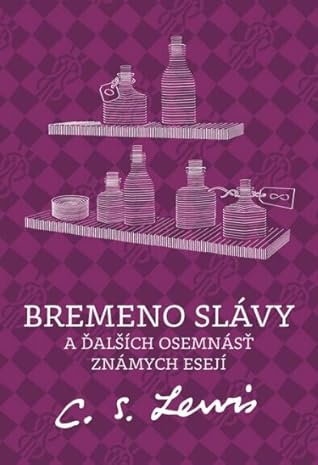- Bíblia
- Leia a Bíblia
- Versões da Bíblia
- Verso do dia
- Planos de Leitura
- Versos por Tópico
- Books of the Bible
- Imagens bíblicas
- Estude
- Comentários
- Concordâncias
- Dicionários
- Enciclopédias
- Sermões
- Bible Atlas & Maps
- BP Wiki
- Devocionais
- Devocionais de hoje
- Light of the World
- Todos os devocionais
- Inspirational Quotes
- Mais
- Picture Quotes
- Videos
- Inspirador
- Estudo da Bíblia
- O que a Bíblia diz
- Bible Q&As
- Daily Bread
- Bible by Genre
- Bible Stories
- Random Bible Verse
- Comunidade
- Store
Bremeno slávy a ďalších osemnásť známych esejí
by C.S. Lewis
C. S. Lewis nebol len známy spisovateľ a majster písaného slova, ale aj obdarovaný prednášateľ a komunikátor. Počas svojho tvorivého života napísal množstvo esejí, článkov a prednášok, ktoré po jeho smrti vychádzali v rôznych zbierkach a vydaniach, najmä vďaka poctivej edičnej práci Waltera Hoopera – osobného sekretára a správcu Lewisovej literárnej pozostalosti. Kniha BREMENO SLÁVY je prvé slovenské vydanie takejto zbierky a obsahuje devätnásť najznámejších esejistických textov C.S. Lewisa:
1. Bulverizmus alebo „Ako stratiť schopnosť myslieť“
2. Účinnosť modlitby
3. Slony a peľ papradí
4. Boh na lavici obžalovaných
5. „Odporná červená vodička“
6. Teória humánneho trestu
7. Užší kruh
8. Je teológia poéziou?
9. Všetko sa začalo obrazom...
10. Zázraky
11. Mýtus sa stal skutočnosťou
12. O čítaní starých kníh
13. Naša viera a mimozemské civilizácie
14. Náboženstvo: realita alebo náhrada?
15. Krutodlakov prípitok
16. Prerieknutie
17. Pokusy na živých tvoroch
18. Prečo nie som pacifista
19. Bremeno slávy
1. Bulverizmus alebo „Ako stratiť schopnosť myslieť“
2. Účinnosť modlitby
3. Slony a peľ papradí
4. Boh na lavici obžalovaných
5. „Odporná červená vodička“
6. Teória humánneho trestu
7. Užší kruh
8. Je teológia poéziou?
9. Všetko sa začalo obrazom...
10. Zázraky
11. Mýtus sa stal skutočnosťou
12. O čítaní starých kníh
13. Naša viera a mimozemské civilizácie
14. Náboženstvo: realita alebo náhrada?
15. Krutodlakov prípitok
16. Prerieknutie
17. Pokusy na živých tvoroch
18. Prečo nie som pacifista
19. Bremeno slávy
BUY NOW
Hardcover, 272 pages
Published 2021 by Porta libri
Se inscrever
© 2025 Bibleportal.com Todos os direitos reservados.

Clive Staples Lewis was born in Ireland, in Belfast on 29 November 1898. His mother was a devout Christian and made efforts to influence his beliefs. When she died in his early youth her influence waned and Lewis was subject to the musings and mutterings of his friends who were decidedly agnostic and atheistic. It would not be until later, in a moment of clear rationality that he first came to a belief in God and later became a Christian.
C. S. Lewis volunteered for the army in 1917 and was wounded in the trenches in World War I. After the war, he attended university at Oxford. Soon, he found himself on the faculty of Magdalen College where he taught Mediaeval and Renaissance English.
Throughout his academic career he wrote clearly on the topic of religion. His most famous works include the Screwtape Letters and the Chronicles of Narnia. The atmosphere at Oxford and Cambridge tended to skepticism. Lewis used this skepticism as a foil. He intelligently saw Christianity as a necessary fact that could be seen clearly in science.
"Surprised by Joy" is Lewis's autobiography chronicling his reluctant conversion from atheism to Christianity in 1931.
... Show more